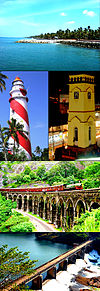
Kollam, is an ancient seaport and the fourth largest city in the Indian state of Kerala. Located on the southern tip of the Malabar Coast of the Arabian Sea, the city is on the banks of Ashtamudi Lake and is 71 kilometers northwest of the state capital, Thiruvanathapuram (Trivandrum). Kollam is one of India's oldest continuously inhabited cities, with evidence of habitation stretching back to the megalithic; the city has also been a maritime entrepôt millennia, the earliest attestation of which dates back to the Phoenicians and Romans. It is the southern gateway to the Backwaters of Kerala, and is known for its cashew processing, coir manufacturing, and tourism industries.

The Kerala backwaters are a network of brackish lagoons and canals lying parallel to the Arabian Sea of the Malabar coast of Kerala state in south-western India. It also includes interconnected lakes, rivers, and inlets, a labyrinthine system formed by more than 900 km (560 mi) of waterways, and sometimes compared to bayous. The network includes five large lakes linked by canals, both man made and natural, fed by 38 rivers, and extending virtually half the length of Kerala state. The backwaters were formed by the action of waves and shore currents creating low barrier islands across the mouths of the many rivers flowing down from the Western Ghats range. In the midst of this landscape there are a number of towns and cities, which serve as the starting and end points of backwater cruises. There are 34 backwaters in Kerala. Out of it, 27 are located either closer to Arabian Sea or parallel to the sea. The remaining 7 are inland navigation routes.

Ashtamudi Lake, in the Kollam District of the Indian state of Kerala is a unique wetland ecosystem and a large palm-shaped water body. It is second only in size to the Vembanad estuary ecosystem of the state. Ashtamudi means 'eight hills or peaks' in the local Malayalam language. The name is indicative of the lake's topography with its multiple branches. The lake is also called the gateway to the backwaters of Kerala and is well known for its houseboat and backwater resorts. Ashtamudi Wetland was included in the list of wetlands of international importance, as defined by the Ramsar Convention for the conservation and sustainable utilization of wetlands. Ashtamudi Estuary is the deepest among all the estuaries in Kerala, with a maximum depth of 6.4 meters at the confluence zone.
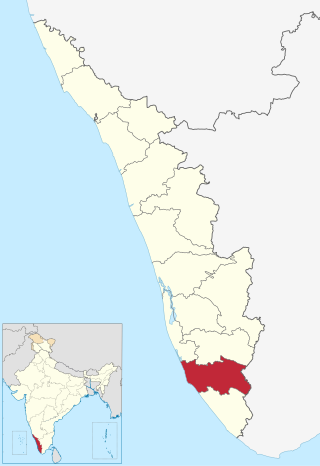
Kollam district, is one of 14 districts of the state of Kerala, India. The district has a cross-section of Kerala's natural attributes; it is endowed with a long coastline, a major Laccadive Sea seaport and an inland lake. The district has many water bodies. Kallada River is one among them, and land on the east bank of the river is East Kallada and that on the west bank is West Kallada.
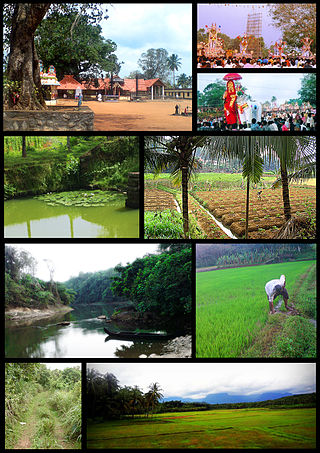
Pattazhy, also Pattazhi is a village located in Pathanapuram taluk in the eastern part of the Kollam District, Kerala state, India. It is best known as the site of an ancient Bhagavathy temple, Pattazhy Devi Temple.
Karunagappally is a municipality in the Kollam district of Kerala, India. It is 24 km north of Kollam and 60 km (37 mi) south of Alappuzha. Karunagappally taluk consists of Alappad, Ochira, Adinad, Karunagappally, Thazhava, Pavumba, Thodiyoor, Kallalibhagom, Thevalakkara, Chavara, Neendakara, Clappana, Kulasekharapuram, Thekkumbhagam, Ayanivelikulangara, Panmana, Ponmana and Vadakumthala. The taluk is bound on the north by Kayamkulam, on the east by Kunnathur taluk, on the south by Kollam and on the west by the Arabian Sea. It is one of the fastest developing towns in Kerala and is part of Kollam metropolitan area.

Anandavalleeswaram Sri Mahadevar Temple in Kollam city is one of the ancient Hindu temples in Kerala, India. Lord Siva and Goddess Anandavally are the main deities of the temple. According to folklore, sage Parashurama has installed the idol of Lord Shiva. The temple is a part of the 108 famous Shiva temples in Kerala. It is located at Anandavalleeswaram, a major neighborhood of Kollam city, that comes to the west side of Kollam Collectorate.

United Trade Union Congress (Bolshevik) is a federation of trade unions in Kerala, India. UTUC(B) emerged from a split in the United Trade Union Congress. UTUC(B) is politically tied to Revolutionary Socialist Party (Bolshevik). Initially, K.C. Vamadevan was president of UTUC(B) and T.M. Prabha was the general secretary of UTUC(B).

Anchalumoodu is a town and neighbourhood of the city of Kollam, India. It is a historic town near the place, where the Peruman railway accident happened in 1988. Anchalumoodu is 8 km away from Kollam city, 26 km from Paravur and 8 km from Kundara town. College of Engineering, Perumon is very close to this place. Anchalumoodu was a part of Thrikkadavoor till 2015. In May 2015, Government of Kerala have decided to expand City Corporation of Kollam by merging Thrikkadavoor panchayath. Now Anchalumoodu along with Thrikkadavoor is a part of Kollam city.

Thrikkadavoor is a town and a neighbourhood of Kollam city in the state of Kerala, India. It is located approximately 5 kilometres north of Kollam city centre and 30 kilometres away from Paravur, Thrikkadavoor has become a bustling urban center, and is now home to educational institutions, five star hotel, local business establishments and major recent real estate ventures
Thrikkadavoor was a separate panchayath till 2015. In May 2015, Government of Kerala have decided to expand City Corporation of Kollam by merging Thrikkadavoor panchayath.

Kerala Minerals and Metals Ltd is an integrated titanium dioxide manufacturing public sector undertaking in Kollam, Kerala, India. Its operations comprise mining, mineral separation, synthetic rutile and pigment-production plants. Apart from producing rutile-grade titanium dioxide pigment for various types of industries, it also produces other products like ilmenite, rutile, zircon, sillimanite, synthetic rutile etc. It is one of the best performing Public Sector Units in India. The company manufactures titanium dioxide through the chloride route. The different grades are produced by KMML under the brand name KEMOX.
Hinduism, Islam and Christianity are the prominent religions in Kollam district. As per the Census 2011, out of the total population of 2,635,375 persons, 64.42% follow Hinduism, 19.30% follow Islam and 16.00% follow Christianity. Other religions comprise 0.04%, while 0.25% did not state any religion.

Chavara Thekkumbhagom or Chavara South is an Island village in Kollam District of the state of kerala, India. It is located 10 km from the Kollam City. It is covered by Ashtamudi Lake and located near the coast of Indian Ocean.It contains a famous Devi temple and Subramanya temple along with St Joseph's Church. There are no Muslims or a Muslim Mosque in the village. It has only 2 outer connections via Dalavapuram pallikodi Bridge and Pavumba Bridge.
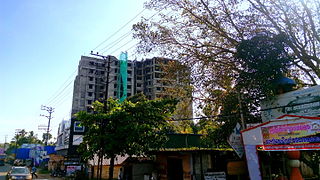
Ramankulangara is a neighbourhood of Kollam city, India. It is 4 km away from Chinnakada and nearly 5 km from Kollam Junction Railway Station. Ramankulangara lies on the north side of the city. It is in Kavanad council of Kollam Municipal Corporation.
Panakkattodil Devi Temple is a Hindu temple in Chavara Thekkumbhagom village in Kollam district of the Indian state of Kerala. Primary deity of this temple is Durga. The temple is managed by the Travancore Devaswom Board, Kerala. The Thalappoli in 'Meda Bharani' and the annual festival during the months of April and May are popular.
This is a list of countries by titanium sponge production based on USGS figures. The production figures are for titanium sponge, units are in metric tons.
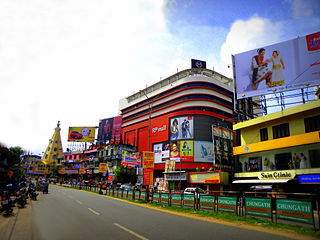
Kollam or Quilon is an old seaport and a city on the Laccadive Sea coast in Kerala, India, on Ashtamudi Lake. The city remains notable as the ancient commercial capital of Kerala and the southwestern Indian coast, in addition to its fame as the "Cashew Capital of the World". The Kollam Municipal Corporation has the second largest budget in Kerala in terms of revenue and expenditure.

City of Kollam or Quilon is known as Prince of Arabian Sea, situated on the banks of Arabian Sea and Ashtamudi Lake. A major portion of Kollam Municipal Corporation area is occupied by Ashtamudi Lake. It is the most visited backwater and lake of Kerala, with a unique wetland ecosystem, a palm-shaped large water body, next only to the Vembanad estuary ecosystem of the state. Ashtamudi means 'eight coned'(Ashta = 'eight'; mudi = 'coned') in the local language of Malayalam. This name is indicative of the lake's topography: a lake with multiple branches. The lake is also called the gateway to the backwaters of Kerala. This lake is extremely famous for House Boat and Backwater Resorts.
Titanium Sponge Plant of India is located at Kerala Minerals and Metals Ltd (KMML), Chavara, Kollam district of Kerala. Titanium sponge plant is a manufacturing plant which produces titanium sponge, a material which has very useful applications in space programme and other strategic areas like aeronautics, light defence vehicles etc. The plant in India is the only one in the world which can undertake all the different activities of manufacturing aerospace grade titanium sponge under one roof. The material is an alloy product which is produced through Kroll process which includes leaching or heated vacuum distillation to make the metal almost 99.7% pure.

City of Kollam or Quilon is a Port city in South India and was the commercial capital of erstwhile Kingdom of Travancore. It is situated on the Laccadive Sea coast of South Kerala. The city is known as the "Gateway to the backwaters of Kerala". The city lies on the banks of Ashtamudi Lake, Kerala's second largest lake, on the Arabian sea coast. Major parts of Kollam city are covered by Ashtamudi Lake.



















